Beckley, Oxfordshire (†Oxford) C.14/15
Doom
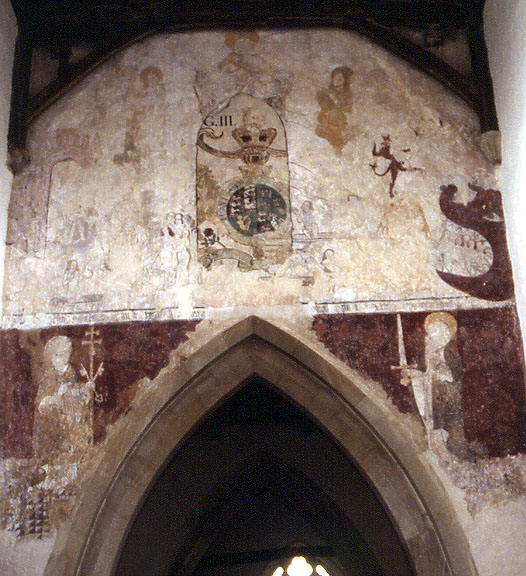
A very large Doom over the chancel arch. At some point in the 18th century the Royal Arms – apparently of King George III – has been superimposed on the central part, giving the unfortunate impression that the judging Christ, a faint figure at the top centre of the painting, is displaying these for our edification. The rainbow on which Christ sits is faintly visible as two curving lines, and Mary and John, also faint, kneel on either side of him.
At the far left is the gateway-arch of Heaven, an extremely faint but interesting example with its elaborate detail at the top. There are faint traces of a figure walking through the arch into Heaven, while other figures – a small group of them beside the left-hand edge of the Royal Arms – make their way in the same direction. Others are still rising from their graves. The Mouth of Hell, in its traditional form and crowded with the damned, looms at the lower right (detail, below right).
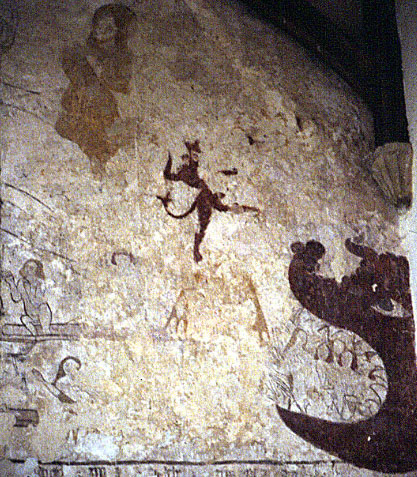
Other risen or rising dead appear on the Hell-side of the painting, and something painted in yellow, with what seem to be outspread bat-like wings stands outside the Hell-Mouth, but this detail is very faint and incomplete. Above it, though, is what seems to be a prancing red-brown devil, with a forked tail, evidently exultant at the fate of the Damned.
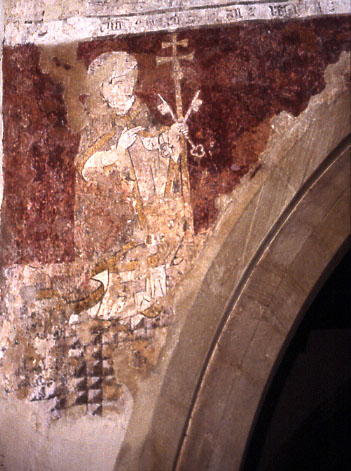
Below the Doom proper a Latin inscription runs across the entire face of the chancel arch wall. EW Tristram could not decipher it, and neither can I, although it might be possible to make some of it out from a higher and closer vantage-point. It is perhaps an extended version of Christ’s words to the risen dead – ‘Venite, benediciti…Ite, maledicti…’, of which the clearest example in these pages is at South Leigh, also in Oxfordshire.
Below this, on either side of the chancel arch opening, stand Saints Peter and Paul. Peter, on the left and shown left here, is robed as a bishop and holds a tall Patriarchal staff with a double cross, along with his keys, very prominently displayed. The tesselated pavement, with diagonally shaded areas in the squares, on which he stands is an unusual detail in English medieval church painting, but it is commonly found in French examples, where it is not confined to this subject. At the right opposite Peter is Paul, shown below left here. He is much more simply clad, and holding his attribute, the upright sword. He holds something else in his left hand, perhaps a book, but it is impossible to be sure.
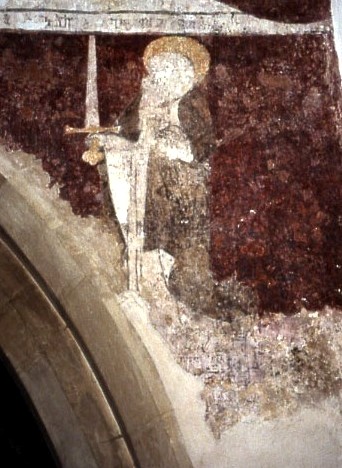
Whether Peter and Paul were painted at the same time as the Doom above them, and are intended to be seen as associated with the Judgement is hard to say. They may be intended as co-assessors, with Paul in this case added to the original twelve Apostles (Judas Iscariot excluded). The Apostles’ co-assessor status is often emphasised in earlier painting, such as that at Kempley in Gloucestershire, but it is far less usual to find this element as late as the fifteenth century (the Doom at Blyth in Nottinghamshire might be another example, but a painter’s intentions are always hard to judge). In the case of Beckley, Peter and Paul may have been added afterwards, although the two figures are certainly roughly contemporary with the Doom itself. Further discussion of the significance of Peter and Paul when found together is in the pages for Black Bourton, also in Oxfordshire.
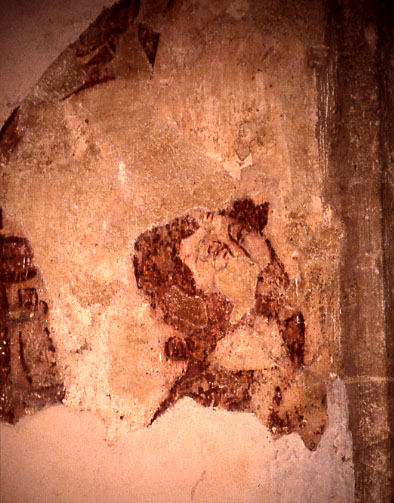
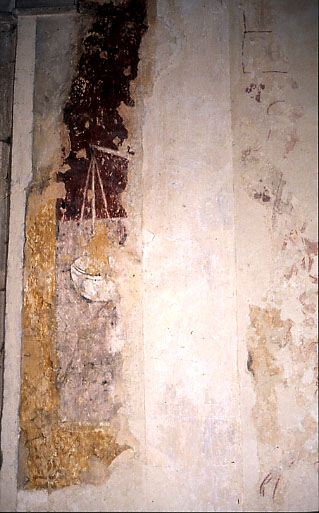
Another detail, one which possibly strengthens the argument for Peter and Paul as integral to the Doom, is painted below Peter, quite low on the wall (detail, left). This is the head of a man, thrown back to look upwards towards the two Saints and above them to the Doom. He is framed within a trefoil arch and although most of his body is obliterated he seems to be in a kneeling posture. He might be the donor of the painting, but I think he is holding something in front of him. Two very faint but definite narrow parallel lines cross the neckline of his garment, and there is a suggestion of another line or lines crossing those and giving the appearance of two stick-like objects crossing each other in the shape of an ‘X’. I do not think it is over-fanciful to suggest that this might be the painter, in the position of a supplicant and holding out the tools of his trade towards the judge and the saints.¹
Finally, in the south aisle of the church, and thus entirely detached from the Doom, is a remnant of something that is almost certainly a Weighing of Souls. Only a single hanging pan of a balance and a broad gold border remain (detail, right), but it is enough to make the identification certain. It seems to be of the same date as the Doom, but not enough is left for certainty, and it might be earlier.
The Virgin suckling the Christ Child and its associated subjects are to the right of the Weighing of Souls, and possibly there is other painting elsewhere in the church, perhaps under plaster, or in the case of the west wall, under more 18th century heraldic and decorative painting by the same hand as the Royal Arms.
Website for Church of the Assumption, Beckley
¹ ET Long assigns the Doom itself to the early 15th century and this kneeling figure to the 14th, but Tristram includes the Doom in his 14th century volume. He does not mention the kneeling man. [ET Long, Medieval Wall Paintings in Oxfordshire Churches, Oxfordshireiensia, Vol.XXXVII, 1972, p.91; Tristram III, p.139]